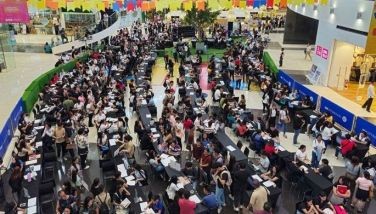Smart opens 4th wireless lab at PUP
August 25, 2003 | 12:00am
Eight years after graduating from the Polytechnic University of the Philippines (PUP), Cynthia Capua recently found herself teaching her former professors.
A computer engineering major, Capua now works for cellular giant Smart Communications Inc. She is a member of the team that is implementing a company program designed to help raise the quality of engineering education in the country. Part of her job is to give faculty members seminars on wireless communications.
"For a while, it felt strange giving lectures to my former teachers," she said. "But it also felt good that SWEEP has given us a chance to give something of value back to my alma mater."
SWEEP is short for Smart Wireless Engineering Education Program. Under this program, Smart sets up in partner-schools wireless laboratories for the use of students taking up electronics and communications engineering (ECE). The company also provides follow-through training sessions for students and faculty on advanced wireless technologies.
Last week, Smart inaugurated its wireless lab in PUP. And the event became a happy homecoming for Capua and a dozen other PUP alumni who now work for Smart. There are a total of 212 PUP graduates among Smart’s approximately 5,500 employees.
"I am a proud graduate of PUP. I was hired by Smart directly after graduation. This was in May 1995," Capua said. Weeks before the inauguration of the wireless lab in PUP, she was back in the campus to train the faculty of the ECE department on how to use the facility in teaching their students.
The Smart Wireless Laboratory at the National Development Corp. (NDC) campus of PUP in Sta. Mesa, Manila is the fourth such facility completed under the industry-academe partnership program launched by Smart this year.
"We aim to help ECE students acquire a more realistic understanding of the field of wireless communications. This can be done through the wireless lab and also through the sharing of practical experience by our engineers in building and operating the country’s most extensive digital mobile phone network," said Smart president and chief executive officer Napoleon Nazareno during the lab’s inauguration.
"With government support declining, state universities are hard put trying to maintain their operations and improve their facilities. An initiative such as this undertaken by Smart is indeed very welcome," said Dr. Samuel Salvador, PUP’s officer-in-charge and vice president for academic affairs.
About 1,200 ECE students of PUP stand to benefit from SWEEP. With about 50,000 enrollees, the state university has the largest student population in the country. Tuition in PUP is the lowest in Metro Manila at P500 per semester for engineering students and even lower for those taking up other courses.
"The partnership between Smart and PUP will open doors for both parties. SWEEP will bridge the gap between the theories and the actual scenarios in the telecom environment. The training for the instructors will definitely contribute to the improvement of how communications subjects are being taught," said Capua.
The education program for faculty and students covers topics such as Total Access Communications System (TACS), an analog system, and digital technologies like Global System for Mobile communications (GSM), Code Division Multiple Access (CDMA), General Packet Radio Service (GPRS), Short Messaging Service (SMS) and Multimedia Messaging Service (MMS).
The wireless lab, on the other hand, showcases cellular network equipment from Smart’s analog network such as radio cabinets, rectifier units, a battery bank, antennas and a computer control console. The facility also contains a working GSM cellsite that will not only improve cellular coverage for the campus but can also be used as part of an on-the-job training program for students.
While she was a student in PUP, Capua said majority of the lectures was based on theories and diagrams on the textbook.
"Our communications subjects then were purely lectures. You need a very vivid imagination to be able to visualize what the instructors were trying to explain on the board," she recalled.
"With the Smart Wireless Laboratory, instructors and students can better appreciate telecommunications technologies and come up with laboratory activities. The seminars that will be conducted periodically will give students an advantage when they graduate and seek employment," she added.
Aside from PUP, Smart has set up wireless laboratories at the Bulacan State University, Adamson University and the University of San Carlos in Cebu. It is in the process of setting up similar facilities in more campuses nationwide.
"By the end of the year, we hope to have at least 20 partner-schools participating in the program," said Nazareno.
A computer engineering major, Capua now works for cellular giant Smart Communications Inc. She is a member of the team that is implementing a company program designed to help raise the quality of engineering education in the country. Part of her job is to give faculty members seminars on wireless communications.
"For a while, it felt strange giving lectures to my former teachers," she said. "But it also felt good that SWEEP has given us a chance to give something of value back to my alma mater."
SWEEP is short for Smart Wireless Engineering Education Program. Under this program, Smart sets up in partner-schools wireless laboratories for the use of students taking up electronics and communications engineering (ECE). The company also provides follow-through training sessions for students and faculty on advanced wireless technologies.
Last week, Smart inaugurated its wireless lab in PUP. And the event became a happy homecoming for Capua and a dozen other PUP alumni who now work for Smart. There are a total of 212 PUP graduates among Smart’s approximately 5,500 employees.
"I am a proud graduate of PUP. I was hired by Smart directly after graduation. This was in May 1995," Capua said. Weeks before the inauguration of the wireless lab in PUP, she was back in the campus to train the faculty of the ECE department on how to use the facility in teaching their students.
"We aim to help ECE students acquire a more realistic understanding of the field of wireless communications. This can be done through the wireless lab and also through the sharing of practical experience by our engineers in building and operating the country’s most extensive digital mobile phone network," said Smart president and chief executive officer Napoleon Nazareno during the lab’s inauguration.
"With government support declining, state universities are hard put trying to maintain their operations and improve their facilities. An initiative such as this undertaken by Smart is indeed very welcome," said Dr. Samuel Salvador, PUP’s officer-in-charge and vice president for academic affairs.
About 1,200 ECE students of PUP stand to benefit from SWEEP. With about 50,000 enrollees, the state university has the largest student population in the country. Tuition in PUP is the lowest in Metro Manila at P500 per semester for engineering students and even lower for those taking up other courses.
"The partnership between Smart and PUP will open doors for both parties. SWEEP will bridge the gap between the theories and the actual scenarios in the telecom environment. The training for the instructors will definitely contribute to the improvement of how communications subjects are being taught," said Capua.
The wireless lab, on the other hand, showcases cellular network equipment from Smart’s analog network such as radio cabinets, rectifier units, a battery bank, antennas and a computer control console. The facility also contains a working GSM cellsite that will not only improve cellular coverage for the campus but can also be used as part of an on-the-job training program for students.
While she was a student in PUP, Capua said majority of the lectures was based on theories and diagrams on the textbook.
"Our communications subjects then were purely lectures. You need a very vivid imagination to be able to visualize what the instructors were trying to explain on the board," she recalled.
"With the Smart Wireless Laboratory, instructors and students can better appreciate telecommunications technologies and come up with laboratory activities. The seminars that will be conducted periodically will give students an advantage when they graduate and seek employment," she added.
Aside from PUP, Smart has set up wireless laboratories at the Bulacan State University, Adamson University and the University of San Carlos in Cebu. It is in the process of setting up similar facilities in more campuses nationwide.
"By the end of the year, we hope to have at least 20 partner-schools participating in the program," said Nazareno.
BrandSpace Articles
<
>
- Latest
Latest
















